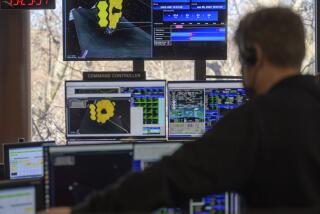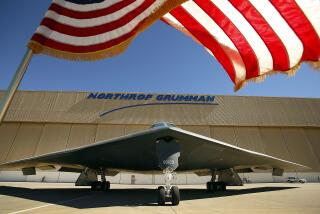Wesley Bush is steering Northrop Grumman in a new direction
- Share via
Since taking the helm of Northrop Grumman Corp. in January, Wesley G. Bush hasn’t wasted any time shaking up one of the world’s largest military contractors.
On his first day on the job, Bush made a stunning announcement that he was moving Northrop’s headquarters out of Los Angeles — where the company has been since it was founded in 1939 — to the Washington area.
He then pulled Northrop out of the Pentagon’s $35-billion aerial refueling tanker competition, shuffled top executives and this week announced he was looking at abandoning the company’s $6-billion-a-year shipbuilding business.
The moves have analysts wondering whether Bush is dismantling a military juggernaut built up by predecessors Kent Kresa and Ronald Sugar.
“The decision to explore strategic alternatives for shipbuilding should not be interpreted as an indication that we are dismantling the company,” Bush said in an e-mail, adding that he might separate Northrop from the shipbuilding business because it didn’t fit with the rest of the company.
But to Loren Thompson, a military policy analyst for the Lexington Institute in Virginia, “Northrop Grumman is a very different company than it was six months ago. Wes Bush is determined to transform the business and culture of Northrop any way he can,” he said.
Since the mid-1990s, Kresa and then Sugar acquired nearly two dozen companies with interests in virtually every aspect of the U.S. military, including building spy satellites and nuclear submarines, managing websites and protecting computer systems against hackers. Northrop Grumman grew from a billion-dollar company on the verge of bankruptcy to a $34-billion behemoth.
But in a conference call Wednesday, Bush said he was closing its shipyard in Avondale, La., near New Orleans, and that the company could get out of the shipbuilding business altogether.
“Going forward we perceive little synergy between shipbuilding and our other businesses,” he said.
Bush, 49, is moving Northrop away from building traditional military hardware, such as massive warships, to developing more high-tech products, such as cyber security and unmanned systems.
Northrop’s largest sector for cyber security work, Information Systems, hires about 4,000 people a year. The company specializes in encryption technology used by U.S. intelligence agencies that could be applied to protecting valuable data.
“He sees Northrop as a company that will lead the way in cutting-edge electronics and information systems,” Thompson said. “That vision does not include industrial metal-bending in shipyards.”
The move to close the Avondale facility came amid the prospects of a slowdown in Pentagon spending on large weapons systems, such as tanks and warships. Last year, Defense Secretary Robert M. Gates proposed a plan to cut major weapons developments worth as much as $330 billion. And in February, the U.S. Navy canceled the planned purchase of two amphibious ships that were to be built at the Avondale shipyard.
The facility employs about 5,000 people. Production will cease in 2013 and operations will be consolidated with the company’s Pascagoula, Miss., shipyard about 125 miles away.
Northrop currently builds transport and amphibious assault ships at both locations. So consolidating ship construction on the Gulf Coast will reduce costs and increase efficiency, Bush said.
“He’s demonstrated that he’s not afraid to be bold in his leadership,” said Ned Douthat, an analyst at Ockham Research, an equity research firm. “It’s not popular right now to take 5,000 jobs away from the Louisiana coast. But it’s the right move for the company, and it provides the most value to shareholders.”
Since 2008, the company has taken more than $430 million in charges against earnings because of delays caused by Hurricane Katrina and production problems.
Northrop picked up the Gulf Coast shipyards in 2001 as part of the acquisition of Litton Industries Inc. Litton had a considerable military electronics business, which appealed to then-CEO Kresa; the two yards came as part of the deal.
Paul H. Nesbit, an aerospace analyst with JSA Research Inc. in Sarasota, Fla., said the main objective of the Litton deal was to expand the electronics business and to acquire some members of Litton’s management team. Shipbuilding was an afterthought.
“Northrop seemed to fall into shipbuilding,” he said. “It never really fit with the rest of Northrop. It operated like a separate company altogether.”
Later in 2001, Northrop bought Newport News Shipbuilding Inc., which builds nuclear submarines and aircraft carriers, to spoil a bid by rival General Dynamics Corp. to become the nation’s largest military shipbuilder.
The ship business accounted for about 18% of Northrop’s revenue last year, which leaves a sizable hole on balance sheets, said Michael O’Hanlon, a senior fellow at the Brookings Institution.
“Traditionally, shipbuilding is not the type of business that’s going to grow exponentially year over year, but it’s not going to diminish very much either,” he said. “It’s a steady stream of revenue because there aren’t that many big shipbuilders in this country.”
General Dynamics is the only other major competitor in the ship business. If General Dynamics makes a bid to buy the shipbuilding business unit from Northrop, the Pentagon has a dilemma on its hands.
“It’s something we’re going to watch closely,” said Cmdr. Victor Chen, a Navy spokesman. “We want to make sure there’s adequate competition in the marketplace.”
Bush put the government in another precarious position in March when he pulled Northrop out of the race for a $35-billion Pentagon contract to build aerial refueling tankers. At the time, he left Northrop’s rival in the competition, Boeing Co., as the sole bidder for one of the largest military contracts in U.S. history because he said the specifications dramatically favored Boeing.
Northrop had been seeking to win the contract since 2007, when it teamed up with Airbus parent European Aeronautic Defense & Space Co.
Northrop spent about $200 million to capture the contract and won, but the decision was later overturned after the Government Accountability Office found that the U.S. Air Force failed to credit Boeing for some of the plane’s capabilities.
After the Pentagon relaunched the competition earlier this year and laid out new specifications in late February, it took just two weeks before Bush said the company wasn’t going to pursue the contract. To him, it wasn’t worth spending money to go after a contract that seemed all but destined to go to Boeing.
With a series of aggressive moves, Bush has shown a real contrast with the leadership of the past, said Rebecca Grant, president of IRIS Independent Research, a military and aerospace consulting firm. Past chief executive transfers of power at Northrop have been rather customary, she said. But Bush has taken the company in a new direction from the start.
“Wes Bush is not hung up on the Northrop Grumman of the past,” Grant said. “Time will tell about his judgment. But I think you have to give him credit for making the tough moves early on.”
More to Read
Inside the business of entertainment
The Wide Shot brings you news, analysis and insights on everything from streaming wars to production — and what it all means for the future.
You may occasionally receive promotional content from the Los Angeles Times.











